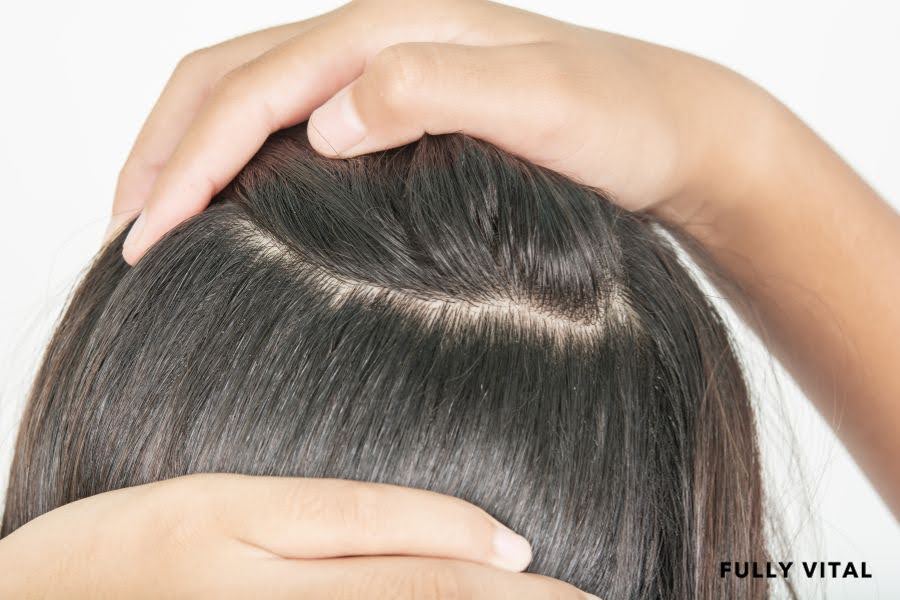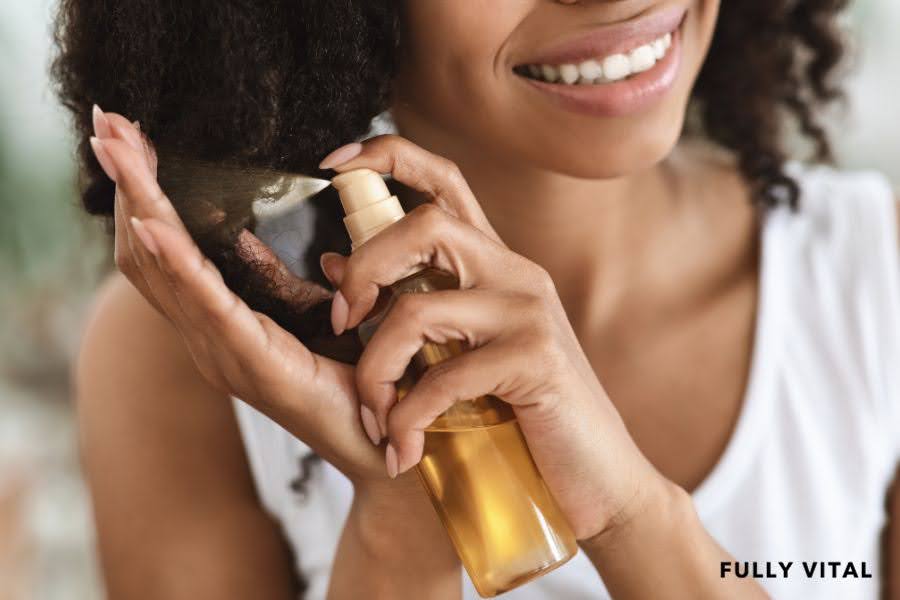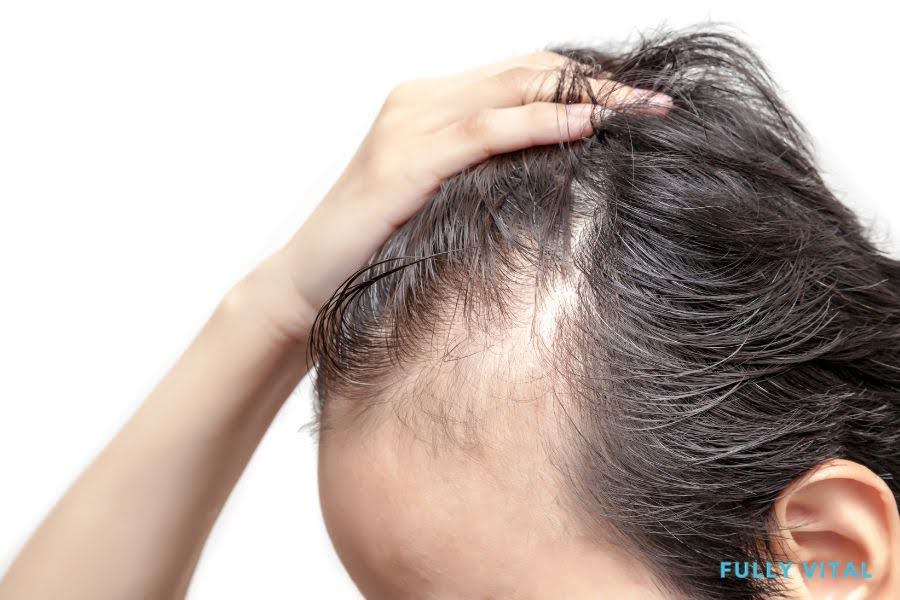
Effective Techniques: Thickening Your Hair At Home
Hair is very important to us, and its look and feel can tell us a lot about our health.
While our genes decide a lot about how our hair is, there are things we can do to make it thicker.
Taking good care of our hair, eating the right foods, and being gentle with our hair can all help it look and feel better.
In this article, we will talk about simple ways you can take care of your hair at home to make it look fuller.
We will cover tips on what to eat to help your hair grow and how to look after your hair to avoid damage.
This advice is based on real research and will help you get thicker, healthier hair.
Let's start learning how to make our hair look its best.
Looking for a natural boost in your hair's volume?
Explore Fully Vital's range of hair growth essentials designed to empower your locks.

I LOVE MY HAIR NOW
FullyVital hair serum and hair vitamins made tremendous improvements in my hair. I truly love my hair now.
Shop Hair ProductsAssessing Your Hair's Current State
Assessing the current state of your hair is an important step in developing a proper hair care routine.
Here's a guide on how to evaluate your hair's health and characteristics:
Recognizing Signs Of Thinning Hair
The first step to thickening your hair is to accurately assess its current state.
Thinning hair can be subtle, often going unnoticed until a significant amount has been lost.
Keep an eye out for more hair collecting in your brush or shower drain, a wider-looking part, or a more visible scalp.
Sometimes, the changes are only noticeable as a decreased weight or volume.
If you find yourself asking if your hair is thinning, it could be time to look closer.
Understanding Genetic And Lifestyle Influences
Hair thickness isn't just about what you put on your head; it's intertwined with genetics and lifestyle choices.
Some people are predisposed to finer hair, while others may experience changes due to aging, hormonal imbalances, or health conditions.
Stress, diet, and rough hair handling can exacerbate thinning.
Acknowledge the role these factors play so you can address them directly in your quest for thicker hair.
Nutrition For Hair Thickness
Nutrition plays a crucial role in maintaining and potentially improving hair thickness.
The health of your hair is a reflection of your overall nutritional status.
Here are key nutrients that are important for hair thickness and the foods that are rich in them:
Key Vitamins And Nutrients
Your diet significantly affects your hair.
Vitamins like biotin, vitamin E, and niacin promote hair health, along with minerals such as zinc and iron.
These nutrients support the hair growth cycle, reinforce hair structure, and prevent breakage.
A deficiency in any of these can result in weaker, thinner hair.
Foods To Incorporate Into Your Diet
To ensure you’re getting enough of these hair-friendly nutrients, include a variety of nuts, eggs, leafy greens, and lean meats into your diet.
These foods are nutrient-dense and help supply your body with the building blocks it needs for producing strong, thick hair strands.

Proper Hair Care Practices
Proper hair care practices are essential for maintaining healthy hair and can also contribute to hair thickness and strength.
Here are some key tips for effective hair care:
Gentle Handling And Reduction Of Breakage
Handle your hair as you would delicate silk.
Excessive pulling, harsh brushing, and tight hairstyles can lead to breakage and hair loss.
Use a wide-tooth comb to gently detangle, especially when your hair is wet and in its most vulnerable state.
Appropriate Washing And Conditioning
Washing your hair too often can strip it of natural oils, leaving it dry and prone to breakage.
Instead, wash your hair a few times a week with a gentle, sulfate-free shampoo and always follow with a conditioner to keep hair nourished, elastic, and less likely to snap.
Scalp Health And Its Role In Hair Thickness
Scalp health is fundamental to hair thickness and overall hair health.
A healthy scalp provides the ideal environment for hair growth and can influence the life cycle of your hair strands.
Here's how scalp health affects hair thickness and some tips to maintain a healthy scalp:
Scalp Massage For Increased Blood Flow
A healthy scalp fosters healthy hair growth.
A simple way to nurture scalp health is through regular scalp massages.
This can stimulate blood flow, nourishing hair follicles and promoting growth.
Dedicate a few minutes daily to massaging your scalp with gentle, circular motions.
Choosing The Right Scalp And Hair Products
Select products designed to support scalp health without harsh chemicals that can irritate or dehydrate your skin.
Look for items containing essential oils like peppermint or rosemary, which can invigorate the scalp and support hair growth without harsh side effects.
The Science Of Hair Growth Cycles
The science of hair growth involves understanding the different stages of the hair growth cycle.
Each hair on our head follows this cycle independently, which prevents all hairs from falling out at once.
The cycle is divided into three distinct phases:
Anagen Phase (Growth Phase)
- Duration: Lasts between 2 to 7 years.
- Characteristics: The cells in the root of the hair are dividing rapidly, adding to the hair shaft. During this phase, hair grows about 1 cm every 28 days.1 Scalp hair stays in this active phase of growth for a longer period than the hair on other parts of the body.
- Influence: Factors like genetics, age, and overall health impact the duration of the Anagen phase.
Catagen Phase (Transition Phase)
- Duration: Lasts about 10 days.
- Characteristics: The hair follicle shrinks and detaches from the dermal papilla (a structure at the base of the hair follicle that provides it with nutrients).2 This phase marks the end of the active growth of a hair.
Telogen Phase (Resting Phase)
- Duration: Lasts around 3 months.
- Characteristics: The old hair rests while a new hair begins the growth phase.3 At the end of the Telogen phase, the old hair is shed, and a new hair continues to grow. Normally, 10-15% of all hair is in this phase at any given time.
Exogen Phase (Shedding Phase)
Sometimes considered a part of the Telogen phase, this is when the old hair is shed, and new hair continues to grow.
Typically, a person loses about 50-100 hairs a day through this natural shedding process.
Preventing Premature Follicle Aging
Preserving the vitality of your hair follicles is crucial for maintaining the thickness of your hair.
Exposure to stress, sun damage, and pollutants can age your follicles prematurely.
Protecting your hair from these factors through proper care and a protective hairstyle can help maintain hair thickness.
DIY Hair Thickening Treatments
DIY hair thickening treatments can be a natural and cost-effective way to improve hair thickness and overall health.
Natural Remedies And Masks
Home remedies can be a simple and natural way to encourage hair thickness.
Ingredients like aloe vera, avocado, or castor oil can be used to create hair masks, providing intensive moisture and nutrients directly to your hair and scalp.
Over-The-Counter Options
There are numerous over-the-counter hair thickening treatments that can also be effective.
These often contain ingredients like minoxidil, which is approved by health authorities to encourage hair growth.
Always be cautious and select products with proven efficacy and minimal adverse effects.

Lifestyle Changes For Hair Vitality
To enhance hair vitality and promote healthier, thicker hair, incorporating certain lifestyle changes can be highly beneficial.
Here's a list of lifestyle adjustments that can positively impact your hair's health:
Stress Reduction Techniques
Stress can wreak havoc on your hair.
High stress levels are linked to conditions such as telogen effluvium, where hair prematurely enters the resting phase and falls out.
Incorporating stress-reduction strategies like meditation, exercise, and adequate sleep can positively influence your hair's health.
Exercise's Impact On Hair Growth
Regular exercise can improve your overall health and, indirectly, the health of your hair.
It promotes blood flow and circulation, which can lead to better nutrient delivery to your scalp and hair follicles.
Consistent physical activity is an essential part of a holistic approach to hair care.
When To Seek Professional Help
Seeking professional help for hair concerns is important when you notice persistent issues that don't improve with basic care and lifestyle changes.
Recognizing Persistent Issues
If you've implemented these home remedies and lifestyle adjustments but still notice excessive hair thinning or loss, it may be time to consult a professional.
Persistent issues can signal an underlying health condition that needs to be addressed by a medical professional or a trichologist.
Medical Treatments And Transplants
Dermatologists and hair specialists can offer treatments ranging from topical applications to hormone therapy, depending on the cause of hair thinning.
In cases of significant hair loss, hair transplants could be a viable solution for some individuals.
These options should be discussed and considered carefully with a qualified health professional.
Myths Vs. Reality: Hair Thickening Claims To Question
When it comes to hair thickening, there are numerous myths and misconceptions floating around.
It's important to differentiate between reality and claims that should be questioned:
Debunking Common Myths
There are numerous myths surrounding hair growth and thickening, from the belief that cutting hair makes it grow thicker to misconceptions about certain "miracle" products.
It's important to approach such claims with skepticism and rely on scientifically proven methods instead.
Evidence-Based Practices To Adopt
Adopt practices that have been demonstrated to work.
This includes managing stress, eating a balanced diet rich in hair-supportive nutrients, maintaining good scalp health, and using products with ingredients clinically shown to boost hair thickness.
Maintaining Your Gains: Long-Term Strategies
Maintaining the health and thickness of your hair over the long term involves a combination of consistent care, healthy lifestyle choices, and being attentive to changes in your hair and scalp.
Here are some long-term strategies to help you maintain your gains:
Consistency In Care
Thickening your hair isn't an overnight feat.
It's about consistency in the routines you establish.
Whether it’s your diet, hair care practices, or exercise, keeping up with these routines steadily over time is what leads to lasting changes.
Monitoring Progress And Adjusting Routines
Keep track of your hair's progress through regular monitoring.
Take photos, note how your scalp feels, and how your hair reacts to different products or routines.
Be prepared to tweak your practices as you learn what works best for you.
Patience and flexibility will be your allies in achieving and maintaining your desired hair thickness.
Elevate your hair with Fully VitalAt Fully Vital, we understand the frustration and disappointment of watching your hair age and lose its vitality. That's why we've developed a range of hair growth products that are designed to help you maintain healthy, strong and youthful-looking locks. Our products are backed by science and are formulated to address the specific needs of aging hair. Here are some key features and benefits of our hair growth products:
Say goodbye to thinning, lackluster locks and say hello to the healthy, vibrant hair you deserve. Try Fully Vital's hair growth products today and experience the difference for yourself. |
Final Thoughts On How To Thicken Hair
In the pursuit of thicker, healthier hair, we've covered a range of home-based techniques that can make a tangible difference.
From adopting a nutrient-rich diet that feeds your follicles to embracing gentle hair care practices that avoid damage, we have seen how small changes can collectively yield significant results.
Proper scalp care, including regular massages, fosters an optimal environment for hair growth, while understanding and reducing stress can prevent hair from entering a premature resting phase.
While these interventions can be powerful, it's important to remember that hair growth is a slow process, and patience is essential.
Monitoring your progress can help you stay motivated and adapt your methods as needed.
If your efforts at home don't lead to the improvements you’re after, remember that professional help is available and can offer more personalized approaches to hair thickening.
Take control of your hair's health with Fully Vital's scientifically formulated products—because your hair deserves the best in growth stimulation.
Check out these blogs:
- Peppermint Oil For Hair Growth: Benefits, Uses, Side-Effects
- Crown Braid: A Stylish And Practical Hairdo For Women
- Exploring Hair Growth Solutions: A Close Look At Spoiled Child Hair And Fully Vital
Frequently Asked Questions About How To Thicken Hair
What are early signs of thinning hair?
Early signs include increased hair shedding, a wider parting, scalp visible through hair, and a decrease in hair volume.
Can dietary changes improve hair thickness?
Yes, including key vitamins and nutrients found in foods like nuts, eggs, and leafy greens can promote hair health and potentially improve thickness.
How often should I wash my hair to encourage thickness?
Limit washing to a few times a week with a gentle, sulfate-free shampoo to maintain natural oils and hair strength.
Are scalp massages effective for hair thickening?
Scalp massages increase blood flow to the scalp, nourishing follicles and potentially stimulating hair growth, contributing to thickness.
What hair care practices should I avoid to prevent hair thinning?
Avoid excessive pulling, harsh brushing, tight hairstyles, and heat styling, as these can lead to breakage and hair loss.
Can stress affect hair thickness?
Yes, stress can lead to conditions such as telogen effluvium, where hair prematurely enters the resting phase and falls out, impacting thickness.
What kind of exercise is best for hair growth?
Any exercise that improves overall health and circulation can indirectly benefit scalp health and hair growth.
When should I seek professional help for hair thinning?
If significant hair thinning continues despite home treatments and lifestyle changes, consult a medical professional or trichologist.
Are there medical treatments to thicken hair?
Medical options range from topical treatments to hormone therapy and should be discussed with a doctor for the individual case.
How can I maintain hair thickness long-term?
Consistency in hair care routines, balanced diet, stress management, and regular monitoring and adjustment of your hair care practices are keys to long-term maintenance.
Sources:
- Montagna, W., & Ellis, R. A. (2013). The Biology of Hair Growth. In Google Books. Elsevier. https://books.google.com/books?hl=en&lr=&id=J6_SBAAAQBAJ&oi=fnd&pg=PP1&dq=The+cells+in+the+root+of+the+hair+are+dividing+rapidly
- Stenn, K. S., & Paus, R. (2001). Controls of Hair Follicle Cycling. Physiological Reviews, 81(1), 449–494. https://doi.org/10.1152/physrev.2001.81.1.449
- Google. (2015). Google Docs: Free Online Documents for Personal Use. Google.com. https://docs.google.com/document/u/0/








